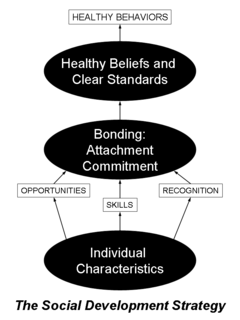
The Environmental Protection Agency (EPA) is an independent executive agency of the United States federal government tasked with environmental protection matters. President Richard Nixon proposed the establishment of EPA on July 9, 1970; it began operation on December 2, 1970, after Nixon signed an executive order. The order establishing the EPA was ratified by committee hearings in the House and Senate. The agency is led by its administrator, who is appointed by the president and approved by the Senate. The current administrator is Michael S. Regan. The EPA is not a Cabinet department, but the administrator is normally given cabinet rank.
The term New Frontier was used by Democratic presidential candidate John F. Kennedy in his acceptance speech in the 1960 United States presidential election to the Democratic National Convention at the Los Angeles Memorial Coliseum as the Democratic slogan to inspire America to support him. The phrase developed into a label for his administration's domestic and foreign programs.
We stand today on the edge of a New Frontier—the frontier of the 1960s, the frontier of unknown opportunities and perils, the frontier of unfilled hopes and unfilled threats. ... The pioneers gave up their safety, their comfort, and sometimes their lives to build our new west. They were determined to make the new world strong and free - an example to the world. ... Some would say that those struggles are all over, that all the horizons have been explored, that all the battles have been won. That there is no longer an American frontier. ... And we stand today on the edge of a new frontier, the frontier of unknown opportunities and perils. ... Beyond that frontier are uncharted areas of science and space, unsolved problems of peace and war, unconquered problems of ignorance and prejudice, unanswered questions of poverty and surplus. ... I'm asking each of you to be pioneers towards that New Frontier. My call is to the young in heart, regardless of age. ... Can we carry through in an age where we will witness not only new breakthroughs in weapons of destruction, but also a race for mastery of the sky and the rain, the ocean and the tides, the far side of space, and the inside of men's minds? ... All mankind waits upon our decision. A whole world waits to see what we shall do. And we cannot fail that trust, and we cannot fail to try.

Preventive healthcare, or prophylaxis, consists of measures taken for the purposes of disease prevention. Disease and disability are affected by environmental factors, genetic predisposition, disease agents, and lifestyle choices, and are dynamic processes which begin before individuals realize they are affected. Disease prevention relies on anticipatory actions that can be categorized as primal, primary, secondary, and tertiary prevention.
The U.S. Senate Environment and Public Works Subcommittee on Chemical Safety, Waste Management, Environmental Justice and Regulatory Oversight is one a subcommittee of the U.S. Senate Committee on Environment and Public Works.
Title 15 of the United States Code outlines the role of commerce and trade in the United States Code. Notable legislation in the title includes the Federal Trade Commission Act, the Clayton Antitrust Act, the Sherman Antitrust Act, the Securities Exchange Act of 1934, the Consumer Product Safety Act, and the CAN-SPAM Act of 2003.
Title 25 of the United States Code outlines the role of Indians in the United States Code.
Title 33 of the United States Code outlines the role of navigable waters in the United States Code.
Executive Schedule is the system of salaries given to the highest-ranked appointed officials in the executive branch of the U.S. government. The president of the United States appoints individuals to these positions, most with the advice and consent of the United States Senate. They include members of the president's Cabinet, several top-ranking officials of each executive department, the directors of some of the more prominent departmental and independent agencies, and several members of the Executive Office of the President.
Title 40 is a part of the United States Code of Federal Regulations. Title 40 arranges mainly environmental regulations that were promulgated by the US Environmental Protection Agency (EPA), based on the provisions of United States laws. Parts of the regulation may be updated annually on July 1.

The Clean Air Act (CAA) is the United States' primary federal air quality law, intended to reduce and control air pollution nationwide. Initially enacted in 1963 and amended many times since, it is one of the United States' first and most influential modern environmental laws.

Communities That Care (CTC) is a program of the Center for Substance Abuse Prevention (CSAP) in the office of the United States Government's Substance Abuse and Mental Health Services Administration (SAMHSA). CTC is a coalition-based prevention operating system that uses a public health approach to prevent youth problem behaviors such as violence, delinquency, school drop out and substance abuse. Using strategic consultation, training, and research-based tools, CTC is designed to help community stakeholders and decision makers understand and apply information about risk and protective factors, and programs that are proven to make a difference in promoting healthy youth development, in order to most effectively address the specific issues facing their community's youth.
The Interagency Working Group on Youth Programs is a group within the executive branch of the U.S. government, and is responsible for promoting healthy outcomes for all youth, including disconnected youth and youth who are at-risk. The Working Group also engages with national, state, local and tribal agencies and organizations, schools, and faith-based and community organizations that serve youth.
Jerry Regier is the Deputy Assistant Secretary for Human Services Policy in the U.S. Department of Health and Human Services As of August 2017. He provides leadership on policy analysis and development in human services and on research under the Assistant Secretary for Planning and Evaluation (ASPE) for Secretary Mike Leavitt.

Buy Quiet is an American health and safety initiative to select and purchase the lowest noise emitting power tools and machinery in order to reduce occupational and community noise exposure. Buy Quiet Programs are examples of noise control strategies. Buy Quiet is part of the larger Hearing Loss Prevention Program, and is an example of Prevention Through Design, which seeks to reduce occupational injury through prevention considerations in designs that impact workers.

The Bureau of State Services (BSS) was one of three principal operating agencies of the United States Public Health Service (PHS) from 1943 until 1966. The bureau contained the PHS divisions that administered cooperative services to U.S. states through technical and financial assistance, and included significant programs in community health, environmental health, and workforce development.
Community Crime Prevention relates to interventions designed to bring reform to the social conditions that influence, and encourage, offending in residential communities. Community crime prevention has a main focus on both the social and local institutions found within communities which can influence crime rates, specifically juvenile delinquency.






